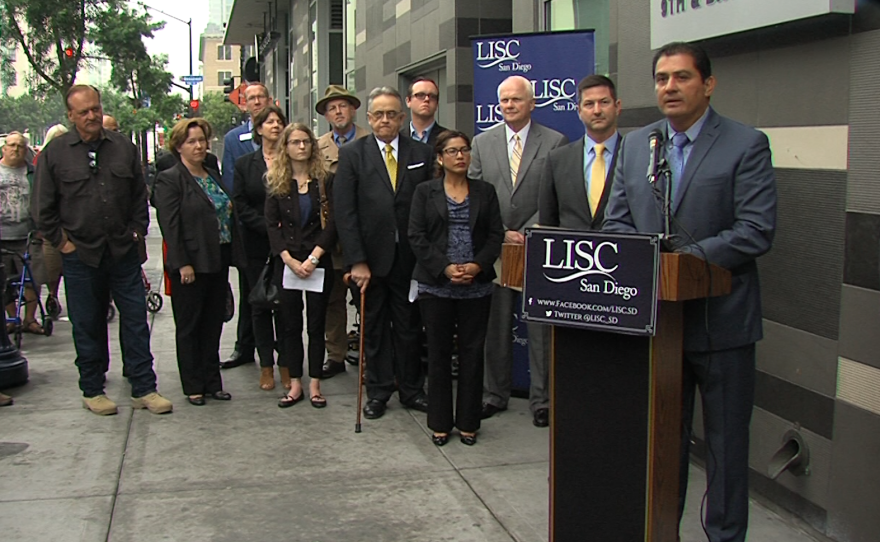California’s Public Records Act gives the public access to government records. But a new bill, if passed, would require anyone requesting public records to go to mediation with a public agency before suing to obtain them. It would also make it harder to collect attorney’s fees from public agencies not complying with the law.
The bill was written by state Sen. Ben Hueso, who represents the 40th District. The district includes Imperial Beach, Chula Vista, National City, portions of San Diego and the Imperial County.
KPBS Midday Edition spoke with Hueso about the bill.
The below answers have been edited for clarity.
Q: A recent state law made police misconduct records available to the public. Did that law play a role in your decision to propose this legislation?
A: Absolutely not. Not at all. These are not related at all.
Q: What inspired you to write this bill?
A: When I learned that in the last few years these (public records) requests have ballooned enormously, over 640 percent in some instances related to the city of San Diego. It's something that I think the public needs to know about. I think it's good that we have transparency and the idea is to get the government fulfilling that information and making it public as soon as possible, but also to minimize the amount of litigation facing these instances if we can. The idea is to provide people in the community with information, but not necessarily reward people that are simply looking to sue a government agency. These lawsuits can be very expensive. And if somebody is only seeking to sue the city or a government agency, we need to find a process that at least ensures that people are given the information they're requesting without it necessarily being motivated by a lawsuit.
Q: Legal counsel for the California Newspaper Publishers Association has said this bill would make it more difficult for members of the public to get information about their government. Was that your goal?
A: I disagree with that. I think it would be easier for members of the public. If you don't have an attorney, if you're not motivated by a lawsuit, it would actually be easier under this bill because it would put you in a meet-and-confer process. It would put you in front of a city official for you to request specifically what you're looking for. If I'm a member of the public that can't afford an attorney, that would be a much easier process for me to follow than to have to go through a process of requesting information and then going to litigation. Nobody that I know of has ever taken the city to litigation and it's harder oftentimes to get in front of a public official. If the law says the public official needs to be in front of a person that is a more forceful requirement.
Q: By making it harder for the winning party to collect attorney’s fees, it would essentially make the public pay to enforce the law. Why do you think that should be the case?
A: I don't agree that's true. I don't think that this makes it more difficult to collect a judgment. If people following a meeting, are not satisfied or don't feel that they're being given all the information that they deserve, they can sue and they can be awarded damages. And frankly, there will be more punitive damages against an agency if they if they fail to provide that information to the public willingly and knowingly. And I think that's a much stronger requirement, that if there is willful conduct on behalf of a city to not provide this information to the public they will be punished under my bill.
Q: This bill was sponsored by the San Diego City Attorney’s office. What does that mean? What was their role in proposing this legislation?
A: In essence, they're the ones that need to defend the city and they're the ones that are seeing a problem more than anyone else. The city attorney has come to me with very compelling statistics showing that in the case of an inadvertent mistake if you're handling 4,824 annual requests and you make a mistake and that immediately without any communication with the person requesting it, takes you to court and wins damages simply because they filed a lawsuit. Lawsuits are very expensive. They clog up our courts. That costs the city attorney's office and the city taxpayers a lot of money. Those incidents could be prevented if somebody simply sat down and said look there's a page missing from this document that you sent me or there is some information that may exist that I believe exists that you haven't provided to me. If a simple inadvertent mistake is made in the process of processing all these requests, it could cost taxpayers thousands of, if not tens of thousands or hundreds of thousands of dollars. And that also is not good for the public. It erodes the public's trust that the public is not handling their taxpayer dollars wisely. They want to fix streets and build parks and improve their cities. And I'm trying to create a balance. I'm trying to make sure that we don't erode the public's access to important data. Public transparency is the pillar of our system of government. Without the public knowing what their government is doing and how their taxpayer dollars are being spent, our system of government can not work. So this bill is not intended to somehow stop that flow of information, we're trying to manage the amount of lawsuits and we're trying to stop people from filing frivolous lawsuits more than anything else.







